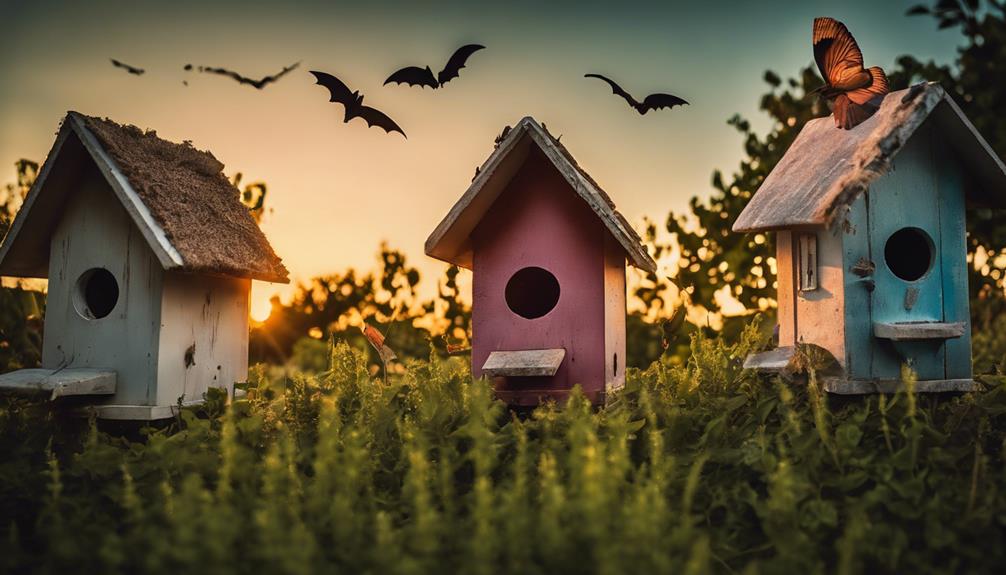To manage mosquitoes naturally in your St. George yard, eliminate stagnant water to prevent breeding. Utilize Bacillus thuringiensis israelensis (BTI) to target larvae effectively. Introduce Gambusia fish in ponds to reduce adult mosquito populations. Establish frog-friendly landscapes as frogs consume mosquitoes. Plant citronella grass, basil, catnip, and lavender to repel mosquitoes naturally. Wear light-colored, long-sleeved clothing for protection. These methods offer a thorough approach to mosquito control.
Key Takeaways
- Eliminate stagnant water sources to prevent mosquito breeding.
- Introduce mosquito-eating fish like Gambusia to reduce adult populations.
- Create frog-friendly landscapes with ponds for natural mosquito control.
- Plant mosquito-repelling garden plants such as citronella and basil.
- Wear protective clothing like light-colored long sleeves to avoid mosquito bites.
Eliminate Breeding Grounds

To effectively control the mosquito population in St. George, it’s imperative to eliminate potential breeding grounds, particularly stagnant water sources. Standing water provides an ideal environment for mosquitoes to lay their eggs, which then hatch into larvae. By removing or addressing areas where water accumulates, such as clogged gutters or old tires, you can greatly reduce the number of breeding sites available to mosquitoes in your yard.
To further enhance your efforts in controlling mosquitoes, consider using Bacillus thuringiensis israelensis (BTI), a natural bacterium that specifically targets mosquito larvae. By introducing BTI into standing water areas, you can effectively prevent the growth and development of mosquito larvae, thereby breaking the mosquito life cycle.
Regular maintenance of your yard, including filling in, draining, or cleaning out areas of stagnant water, and the use of BTI as a preventive measure, will contribute to a significant reduction in the mosquito population around your home. By taking these steps, you can create a more comfortable and mosquito-free environment for yourself and your community in St. George.
Implement Mosquito-Eating Fish
Mosquito-eating fish, such as gambusia, play an essential role in controlling mosquito populations by feeding on mosquito larvae in various aquatic environments. These fish, also known as ‘mosquito fish,’ are effective natural predators of mosquito larvae found in ponds and water features. By introducing mosquito-eating fish into your aquatic ecosystem, you can greatly reduce the number of adult mosquitoes in the area. Stocking ponds or marshes with these fish is a proactive approach to mosquito control that can help create a balanced ecosystem.
The presence of mosquito-eating fish contributes to a healthier environment by targeting mosquito larvae before they mature into biting adults. This natural method of mosquito control not only helps in reducing the nuisance of mosquitoes but also minimizes the need for chemical insecticides. By fostering a habitat that supports mosquito predators like gambusia, you can actively contribute to a more sustainable and eco-friendly approach to managing mosquito populations within your yard.
Create Frog-Friendly Landscapes

Creating frog-friendly landscapes involves strategically designing your yard to attract and support natural mosquito predators like frogs. By incorporating ponds or water features, you can provide suitable habitats for frogs, encouraging them to reside in your yard. Frogs play a vital role in mosquito control as they feed on mosquito larvae, helping to decrease mosquito populations naturally. Additionally, including frog-friendly plants and vegetation further enhances the appeal of your yard to these beneficial amphibians.
To optimize your yard for frog habitation, consider adding sheltered areas such as rocks and logs where frogs can seek refuge and protection. These features create a welcoming environment for frogs and contribute to the overall balance of your ecosystem. By promoting frog-friendly landscapes, you not only support local wildlife but also effectively reduce mosquito populations in a sustainable and environmentally friendly manner. Embracing these practices aligns your yard with the natural order, fostering a harmonious and thriving outdoor space.
Plant Mosquito-Repelling Garden Plants
By strategically planting mosquito-repelling garden plants like citronella grass, basil, catnip, and lavender, you can effectively deter mosquitoes from your outdoor space. Citronella grass, known for its strong scent that masks human odors, is a natural repellent for mosquitoes. Basil, with its aromatic leaves, emits a fragrance that mosquitoes find unpleasant, making it an excellent addition to your garden for natural control.
Catnip, containing nepetalactone, a compound that repels mosquitoes effectively, can be another great plant to contemplate. Lavender, besides adding beauty to your garden, also serves as a mosquito deterrent due to its fragrant scent that mosquitoes dislike. Combining these mosquito-repelling plants in your yard not only enhances the aesthetics but also helps in naturally controlling mosquito populations.
Embracing these plants in your garden landscape can create a pleasant environment while keeping mosquitoes at bay.
Wear Protective Clothing

To effectively protect yourself from mosquitoes, consider wearing light-colored clothing and long-sleeved shirts and pants to minimize exposed skin and lower the risk of mosquito bites. Mosquitoes are naturally attracted to dark colors, so opting for light-colored attire can help deter them during outdoor activities. By covering up with long sleeves and pants, you reduce the amount of skin exposed, making it harder for mosquitoes to find a spot to bite. This simple step of dressing appropriately can greatly decrease the chances of attracting these pesky insects.
Moreover, wearing protective clothing not only acts as a physical barrier against mosquitoes but also reduces the number of bites you may receive. Mosquitoes are weak flyers, and light-colored clothing makes it challenging for them to spot you compared to dark colors. Alongside other preventive measures like using mosquito repellent, dressing right can complement your efforts in minimizing the risk of mosquito-borne illnesses. Remember, when engaging in outdoor activities, the way you dress plays an important role in safeguarding yourself from mosquito bites.
Frequently Asked Questions
What Is the Best Homemade Mosquito Repellent for the Yard?
For your yard, the best homemade mosquito repellent includes essential oil blends with citronella, lavender, and eucalyptus. Mix with carrier oils like coconut or olive oil. Regularly reapply to skin and clothing for effective protection.
How Do I Get Rid of Mosquitoes Outside Naturally?
To naturally get rid of mosquitoes outside, plant citronella, use essential oils, install bat houses, eliminate standing water, grow mosquito repellent plants, and use natural larvicide. Implementing these methods will help create a mosquito-free environment in your yard.
How Do I Get Rid of Mosquitoes in My Yard Permanently?
To get rid of mosquitoes in your yard permanently, implement long-term solutions like eliminating standing water, using eco-friendly BTI bacteria formula, strategic landscaping, and planting mosquito-repelling plants. These preventative measures, along with innovative techniques, sustainable practices, and safe alternatives, guarantee a mosquito-free environment.
Can I Treat My Yard for Mosquitoes Myself?
You can definitely treat your yard for mosquitoes yourself using DIY mosquito control methods. Utilize organic solutions, sustainable methods, and natural remedies like citronella oil. Implement eco-friendly tactics through proper yard maintenance to effectively manage mosquito populations.




